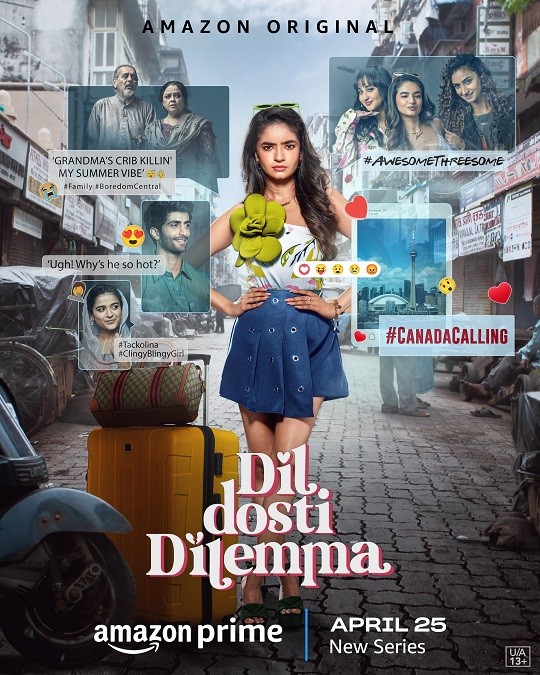Dil Dosti Dilemma (Season 1)
Introduction
I can’t help but think that this series had all the potential to be a cult in the web space! And although the show is a decent watch overall, I couldn’t help but think that the end product was drastically different from what it set out to be initially. Coming of age dramas have got to be one of my favourite genres because it literally warrants a character to have a character arc of sorts which in turn allows the story to complete a storytelling circle. In other words, you may not consciously want to add a specific arc to a character from a writing point of view, instead the story and the situations coupled with how the character reacts to them, would automatically create an arc of sorts in a slice of life drama. Another added advantage is that the story at no point would run the risk of getting heavy, particularly because of the consistent amount of situations created along the way. The only thing to ensure is to retain the core traits of the drama, and not try and overdo stuff by compromising its soul, something that the first season of Dil Dosti Dilemma streaming on Amazon Prime may have marginally been guilty of. This is not to say that the show is below expectations or not watchable, but instead my point is that this show could have been so much more at the end of the day. So stick around for my positives and negatives in my review of Dil Dosti Dilemma here.
Story & Screenplay
The first season of Dil Dosti Dilemma follows the story of a young teenager Asmara belonging to an elite class who is grounded and reprimanded to stay with her grandparents from a relatively lower middle class, in order to learn the value of life outside money. The confusion lies in Asmara lying to her friends in pretending to be in Canada all this while for a holiday. The story here had such an interesting premise with a searing commentary on the class divide that is pretty much prevalent in our society here. And the writing team of Anuradha Tewari, Manjiri Pupala, Raghav Dutt, Bugs Bhargava and Emeara manage to combine this searing commentary in a slice of life and coming of age drama rather effectively. The issue though that I had was that after a point, the writing did lose sight of its simplicity which was the core emotion that it started with, instead trying too hard to say a lot of stuff that didn’t quite have the same kind of an impact in a screenplay standing at 7 episodes ranging from 30 odd to 50 odd minutes each. This is not to say that the show isn’t watchable, but it didn’t quite explore the potential that it seemed to possess at the halfway mark.
The drama begins on a phenomenal note with the introduction of a young protagonist with parents belonging to an elite class, living in the most posh area in the city of Bengaluru. Likewise, each of her friends bond over fashion and gossip and occasionally boys while living a glossy life of their own, while often looking down upon folks who don’t belong to their same status. Oblivious to each of the three friends, each of them have issues of their own while never even remotely discussing the same with each other. There is a genuine freshness in the writing that explores the high society life of Bangalore, a city that plays such an interesting character with a class divide that holds its relevance as the story progresses. The twist in the tale occurs when the protagonist is reprimanded for her behavior with her grandmother(belonging to a lower strata of the society) wherein she is asked to spend her vacations with her, even as her parents would visit Canada for an extended vacation. And thus begins the life altering experience of Asmara.
The proceedings are light and frothy while clearly seeping in a commentary on class divide through the lens of the protagonist. Right from her first step outside her comfort zone to arriving at a world alien to her and trying to fit in, despite all odds stacked against her, form the best parts of the drama. To give her company are her grandparents who have to adjust to Asmara and the choice of clothes that she chooses to don, something that doesn’t fit the bill as per them in a society that they live in. The sight of watching the two worlds collide and eventually meeting a common ground is what did make for an endearing watch up until the halfway mark. On a side note, Asmara’s pretence with her friends did evoke a sense of laughter too, who by the way were dealing with their own sh*t in life. So far so good!
The issue though begins when the drama tries to shed its simplicity and instead focuses on a host of issues and things that it wishes to say, including the family issues from the past to a corporator issue(that forms an integral part of the finale) and water crisis in the area. Amidst all these issues, the core sentiment of the protagonist eventually coming of age is slightly sidelined. What the writers have tried to do is to focus away from the coming of age journey of the protagonist and instead focus on the issues at the grassroot level which wasn’t necessarily a bad thing but that honestly wasn’t the core sentiment of the drama. The core was the realisation of the protagonist that a world did exist outside her caccoon, and that for me would have resulted in an even further heartwarming act. But a needless love story along the way along with the set of issues takes away the shine from the drama that honestly had a lot more potential than what it actually did deliver. The events are still watchable but I did get a little disconnected from it in the end of the second act leading up to the final act, wherein the writing gets cliched with such simplistic solutions to end the drama. The little setup at the end for the second season seemed forced too thereby summing up a screenplay that was decent overall, scoring so well in the first 4 episodes only to taper off at the end.
Dialogues, Music & Direction
The dialogues are very ‘Gen Z’ and go perfectly in sync with the vibe of the drama. Also, I must admit that I learnt a new word ‘Aggro’, something that had no existence in my dictionary previously. The music and BGM are good and maintain a frothy vibe through the notes and melodies throughout the narrative, while also doing their bit in elevating the drama. The lyrics of the show by Shayra Apurva go perfectly in sync with the mood of the drama. The cinematography is quite vibrant to begin with only to soon transition into pale exteriors with frames that beautifully represented the class divide. The costumes are spot on and a key ingredient in showcasing the class divide. The editing is decent but the multiple lags in the second half of the show was evident, something that ought to have been ironed out. Director Debbie Rao does a pretty good job with her world building and characterization, both of which elevate the drama pretty significantly in the first half of the show. However, she does lose her voice to an extent in trying to say many things through to the end that momentarily lowers the impact of the drama. The direction is pretty decent overall.
Performances
The performances are excellent by the ensemble cast and they manage to salvage a sinking ship at the end of the day, to an extent. Eshika Dey as Pushpa, Sudeep Modak as Shadab, Shruti Mishra as Zainab, Sonal Jha as Afroz, Nitya Beria as Nia and Shreya Shanker as Ariana, all have their moments to shine. Samridhi Dutta as Nazneen is terrific and does manage to tickle your funny bone. Rick Roy as David Chenoy is simply hilarious and I found myself cracking up uncontrollaby everytime he tried to speak in Hindi. Akkshit Sukhija as Armaan is quite decent here so is Ritik Ghanshani as Suhail. Tanvi Malhara as Farah manages to impress despite a limited screen presence. Mahesh Thakur as AB and Dilnaz Irani as Nandini are nicely understated and they manage to leave a mark. Samvedna Suwalka as Mandira and Arjun Berry as Dhruv are wonderful additions to the cast and both of them are terrific to witness onscreen. Priyanshu Chatterjee as Rohan and Parinita Seth as Roshni are adequate and lend a good support.
Khalid Siddiqui as Khalid and Shruti Seth as Arshiya come across as pleasant personalities onscreen and both of them are wonderfully understated. Suhasini Mulay as Akhtar Begum is outstanding to the core and her constant rants are so well delivered by her. Vishakha Pandey as Rukhsana is adorable and the bubbly nature of her character beautifully hid the vulnerabilities of her character. She was just so affable that it was hard not to look past her character, everytime she appeared onscreen. Kush Jotwani as Farzaan does a sincere job although I couldn’t help but feel that he was a miscast here. Firstly, his character with his looks and carefully set hair didn’t convince me enough that he belonged to the lower strata of the society. Secondly, the age difference between him and the protagonist(whether intended or not) left me discommected from their love story(not that I have a problem with age difference per se but here it did bother me).
Tanvi Azmi as Naani and Shishir Sharma as Naana make for such a cute couple, often resorting to playful banter but sticking by each other through thick and thin, something that made for a heartwarming watch. Each of them did possess such a warm and disarming smile that instantly did put a smile on my face, yet it was the prowess in their craft that did instill independent traits in each of their characters. Both of them were terrific! Elisha Mayor as Tania has a stellar screen presence and she ably portrays her shades of vulnerability. Revathi Pillai as Naina nails the frivolous notes of her character with utmost ease. Both of them provide a perfect foil of support to the protagonist. Anushka Sen as Asmara is outstanding here with a phenomenal screen presence wherein her personality constantly drives the narrative. She had a lot of the heavy lifting to do and she dabbles with a range of emotions to eventually come out with flying colours.
Conclusion
Boasting of stellar performances, The first season of Dil Dosti Dilemma is a decent coming of age drama that blends itself with an effective commentary on class divide. Yet in trying to say a lot of things, the core of the drama starts to get compromised thereby reducing it to a decent one-time watch. Available on Amazon Prime.




